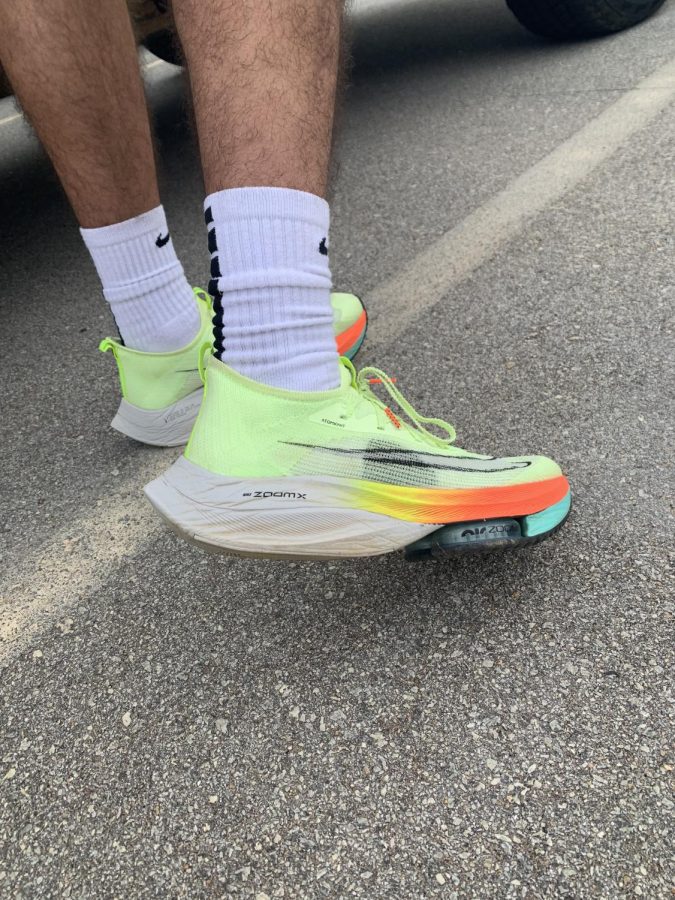Performance-Enhancing Problem
Issues arise with the introduction of technology that improves ability
John Bolinger (12) poses with his pair of Alphaflys.
February 2, 2022
In recent years, the way that sports are experienced has evolved through the creation of new technology which makes them more entertaining. With the usage of performance-enhancing technology such as running shoes and swimming bodysuits, the ethicality of the equipment comes into question.
On Oct. 12, 2019, Eliud Kipchoge amazed the running community with his groundbreaking accomplishment of having the first recorded sub-2-hour marathon. He completed this grueling task with the use of Nike’s Alphafly NEXT% shoes. These specific shoes have carbon-fiber plating and two air pods underneath the forefoot that propel the runner forward. The shoe is made to weigh as little as possible by using Nike’s ZoomX foam which is made to be extremely light, and a lightweight fabric called AtomKnit, which was developed for the shoe to account for the weight added by the air pods. They have a stack height of 39 millimeters, only one millimeter away from the 40-millimeter limit set by World Athletics.
In an interview with highsnobiety.com, Kipchoge spoke about the super-shoes.
“The beauty of the Alphafly is the recovery during training. Your muscles aren’t actually tearing or wearing so easily. So, you can recover a lot faster,” Kipchoge said.
Alphaflys aren’t the only sports equipment catching heat for performance enhancement; using sharkskin-like material like Speedo’s FastSkin LZR Racer greatly reduces water resistance, increasing a swimmer’s overall speed by around 4%. The suit swept through the 2008 Beijing Olympics with 94% of the races that happened being won by people using it. After the success of these suits, all polyurethane and neoprene suits were banned for competition in 2010.
Like the Alphaflys, the LZR Racer was used in a world record attempt in December of 2020 by Caeleb Dressel. Dressel was trying to become the first man to go sub-20 seconds in the 50-meter free event. Because the suit worn in the attempt was banned, if Dressel were to get the time he wanted it could not be counted as a record. Dressel fell short on his goal getting a 20.41, though he later beat this with a time of 20. 16.
Emie Cate Green (10) is a member of the SHS swim team and does not agree with the usage of these suits.
“I personally think it’s unfair to use full tech suits because they make such a difference when you swim, and it doesn’t show your true self,” Green said.
Another questionable ethical point of the Alphaflys and the FastSkin suit is the high price point that the two have. With the Alphaflys retailing at $250 and the FastSkin suit retailing at $550, their usage is limited to those willing to spend that amount. Talented athletes could potentially end up not reaching their full potential simply because they didn’t spend the money to get this equipment.
Sahaan Lawrence (12) competes on the Spartanburg High cross country team and does not own a pair of Alphaflys.
“If they are available to anyone, then I believe they are fair, as long as it’s not something that physically impacts you, such as steroids,” Lawrence said.



